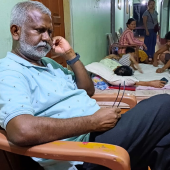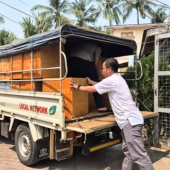Myanmar’s Suu Kyi to serve 6 years in jail after new sentence

A court in Myanmar on Monday sentences ousted leader Aung San Suu Kyi to 4 more years in prison on two charges, as Pope Francis deplores the situation in the south-east Asian nation.
Myanmar’s ousted leader Aung San Suu Kyi has been sentenced to 4 more years in jail by a court in the military-ruled country. The court in the capital Naypyidaw on Monday sentenced her on charges of possession of unlicensed walkie-talkies and flouting a disaster management law.
Myanmar has been in turmoil since the 1 February 2021 military coup that ousted Suu Kyi and her democratically elected civilian government. It led to widespread protests and strikes and signalled the end of 10 years of reforms towards democratic rule following decades of harsh military rule.
Pope deplores Myanmar’s crisis
Hours later on Monday, Pope Francis expressed sadness at the continuing crisis in Myanmar.
“Dialogue and fraternity are all the more urgently needed for dealing wisely and effectively with the crisis which for almost a year now has affected Myanmar,” the Pope said in his annual address to the diplomatic corps in the Vatican.
Myanmar’s “streets, once places of encounter, are now the scene of fighting that does not spare even houses of prayer,” he said, condemning unscrupulous profiteers who exacerbate conflicts by selling weapons. In his speech, the Holy Father also cited other troubled spots and crises across the globe.
The charges
Monday's sentences against Suu Kyi appear to have stemmed from when soldiers searched her house on the day of the coup. Police said 6 illegally imported walkie-talkies were found in her home.
Earlier on Dec. 6, the Myanmar court sentenced Suu Kyi to 2 years in jail for inciting people and breaching a natural disaster management law. With the latest conviction, her prison term adds up to 6 years.
Since the military coup nearly a year ago, she has been detained on about a dozen charges, all of which combine to maximum sentences of more than 100 years in prison. The 76-year-old denies all charges.
Secret trial
Monday's trial in the capital was closed to the media, and Suu Kyi's lawyers have been barred from communicating with the media and public. The 1991 Nobel Peace laureate appeared calm when the verdict was read out on Monday, Reuter said citing a source with knowledge of the court proceedings, who requested anonymity for fear of the junta.
The military has not disclosed where Suu Kyi, who spent years under house arrest under a previous military government, is being detained. It claims she is being given due process by an independent court led by a judge appointed by her own administration.
Rights groups react
Human rights groups have denounced the charges and sentencing as “farcical” and “courtroom circus”. Amnesty International said Monday on Twitter that the new convictions were "the latest act in the farcical trial against the civilian leader".
Phil Robertson, Deputy Asia Director Human Rights Watch, said, “The Myanmar junta’s courtroom circus of secret proceedings on bogus charges is all about steadily piling up more convictions against Aung San Suu Kyi so that she will remain in prison indefinitely.”
"Once again, Aung San Suu Kyi has become a symbol of what is happening to her country and returned to the role of political hostage of military hell-bent on controlling power by using intimidation and violence,'' Robertson said in a statement. "Fortunately for her and the future of Myanmar, the Myanmar people's movement has grown well beyond just the leadership of one woman, and one political party.''
More than 1,400 killed
Amnesty called for the release of Suu Kyi along with thousands of others "unjustly detained" since the coup. She is one of more than 11,400 people to have been arrested by the junta since the coup last year.
More than 1,400 have been killed by security forces as of Monday, according to Assistance Association for Political Prisoners (AAPP), a rights group that has been documenting and compiling fatalities since the military coup.
Thwarted peace efforts
Last week, protests and rallies were held in some parts of Myanmar as people expressed anger over a 2-day visit by Cambodian Prime Minister Hun Sen to Myanmar's junta leader Senior General Min Aung Hlaing.
The Cambodian government explained that the visit which began on Friday hoped to invigorate efforts by the Association of Southeast Asian Nations (ASEAN) to start a peace process in Myanmar, but critics denounced it as legitimizing the military rule and its campaign of violence.
The Cambodian strongman, in power for 36 years, currently holds the chairmanship of the ASEAN. He is the first head of government to visit Myanmar since the military takeover last February.
Last April, ASEAN leaders, including Min Aung Hlaing, agreed on a five-point roadmap toward a peaceful settlement of Myanmar’s crisis, including an end to violence and a political dialogue between all stakeholders, but the effort has been thwarted by the junta.
Radio Veritas Asia (RVA), a media platform of the Catholic Church, aims to share Christ. RVA started in 1969 as a continental Catholic radio station to serve Asian countries in their respective local language, thus earning the tag “the Voice of Asian Christianity.” Responding to the emerging context, RVA embraced media platforms to connect with the global Asian audience via its 21 language websites and various social media platforms.














